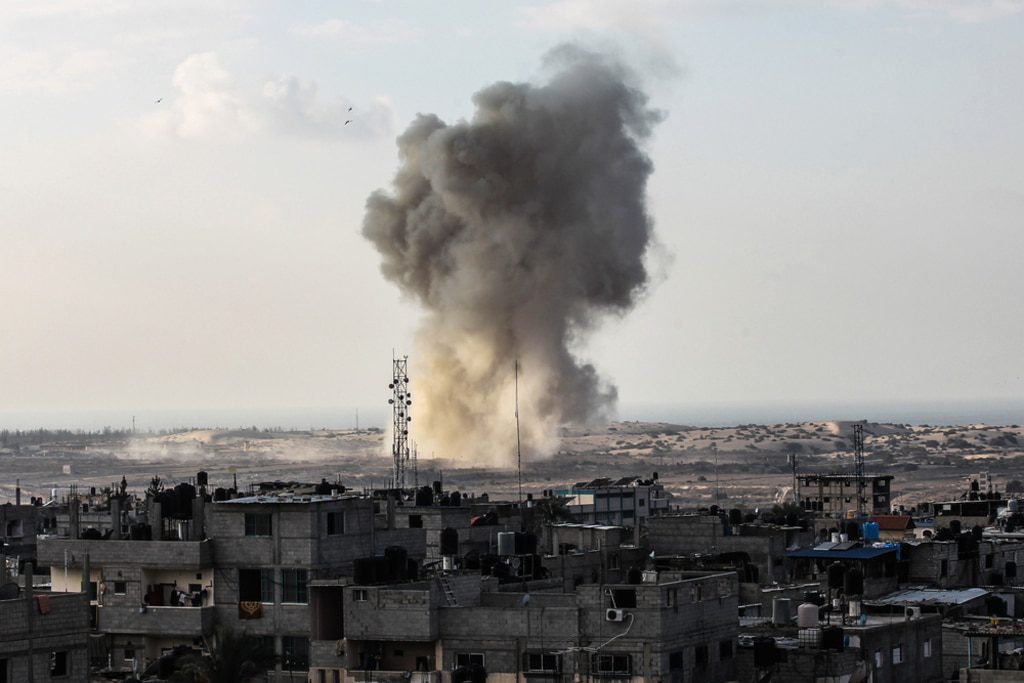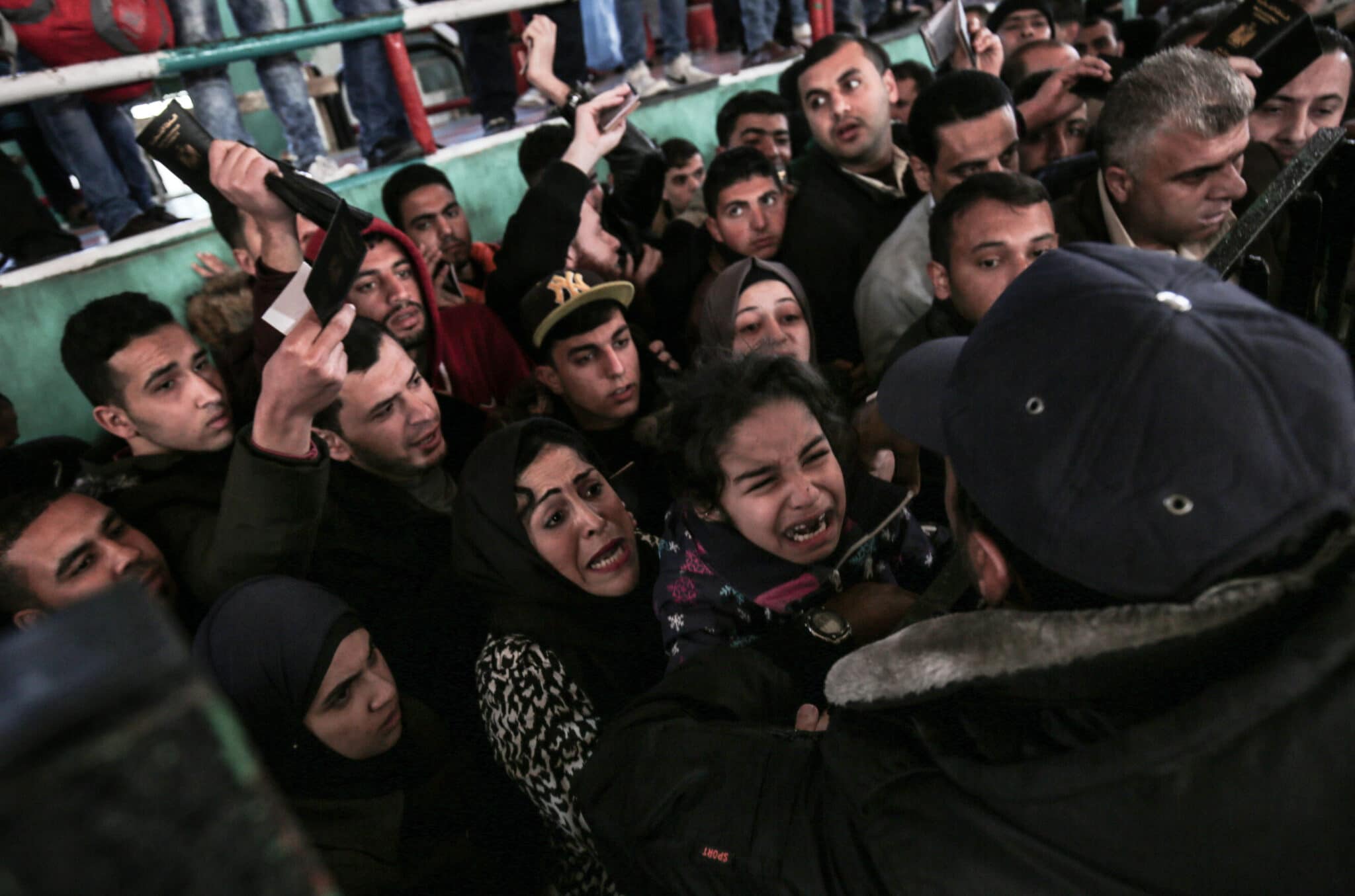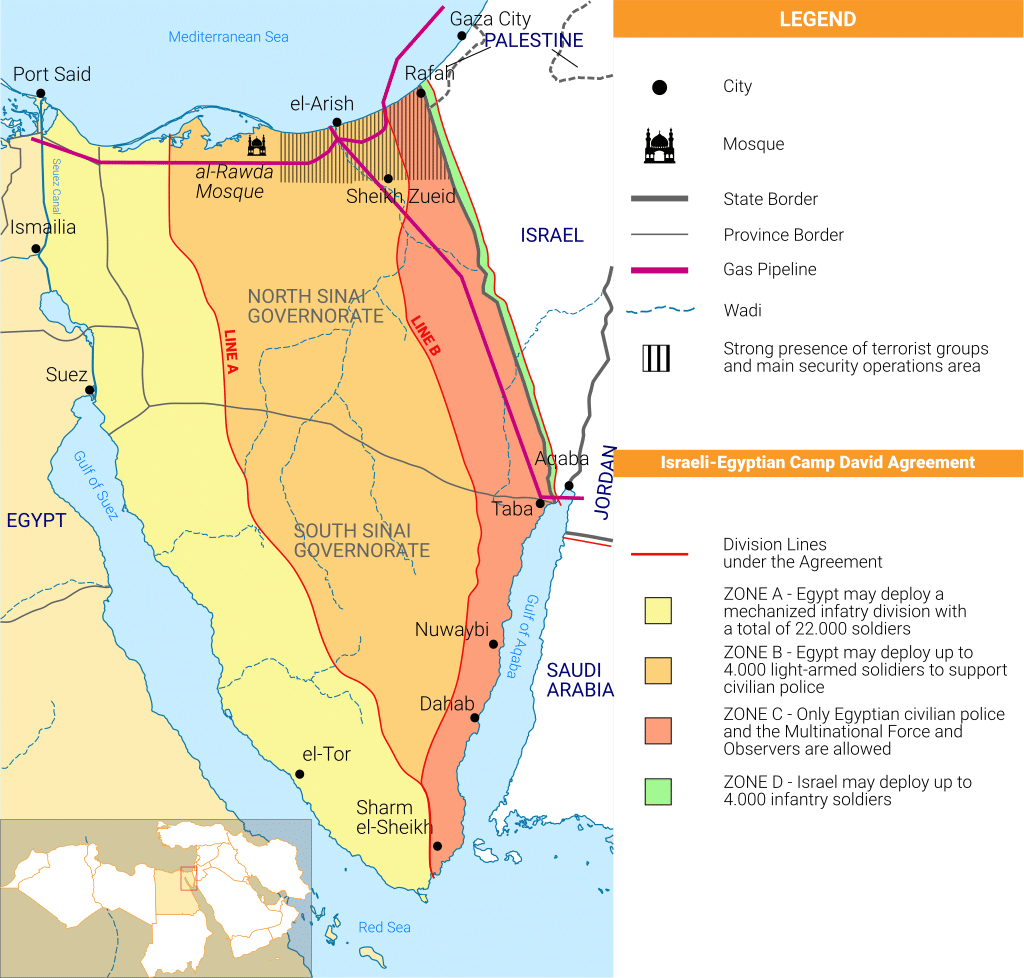
After the deadly 25 November 2017 attack on the al-Rawda Mosque in Egypt’s Sinai region that killed more than 300 people, President Abdel Fattah al-Sisi announced that he would eradicate terrorism in the peninsula within three months. He assigned Mohamed Farid Hegazy, chief of the Egyptian armed forces, and the Ministry of Interior to carry out a military operation codenamed ‘Comprehensive Operation – Sinai 2018’, which was launched on 8 February 2018. It is the largest military operation of its kind launched by the Egyptian army in the past seven years.
Hegazy confirmed that the operation is not only targeting northern Sinai, which includes the border with the Gaza Strip, but also the area around the Suez Canal and the eastern border with Israel and the Gulf of Aqaba.
More than 100,000 military personnel from the land, air and sea forces are participating in the operation, which also involves more than 125 warplanes, surveillance, launchers and helicopters. Moreover, the operation involves the deployment of border forces and patrols to set ambushes and prevent terrorists from crossing into Egypt.
There is no doubt that this operation is not the same as the ones launched in the past. The Egyptian army announced that it aims to achieve four objectives: tightening control over border posts, eliminating terrorist outposts, immunizing local populations against extremist ideologies and tackling the crime rate, which has soared amid the instability.
Although al-Sisi asked for the military operation to achieve its objectives within three months, Hegazy asked al-Sisi not to set a time limit. He said that the operation would continue to prevent the infiltration of terrorists and the smuggling of weapons and ensure that security in Sinai is restored. On the other hand, there is official and popular support to end terrorism in the peninsula. Al-Sisi has even taken to social media to say, “I am proudly following the news of the heroism of my sons in the armed forces and police to clear the precious land of Egypt of terrorists, who are the enemies of life.”
Although the army’s most recent statement claimed that more than 121 terrorists had been killed in the operation, it does not seem to be easy to eliminate terrorism in Sinai. The lack of security has increased since the Egyptian revolution in January 2011. After the fall of Qaddafi in August 2011, arms owned by the Libyan regime fell into the hands of rebels, providing countless quantities of sophisticated weapons that were smuggled to Sinai through the desert. Hardline groups were formed of local Bedouins and extremists from other countries. After the ouster of President Mohamed Morsi in 2013, terrorist attacks against the Egyptian army, police and civilians intensified.
Many political experts and analysts believe that the military operations in Iraq and Syria have dramatically shrunk the areas controlled by the Islamic State (IS) and other terror groups in recent years. This has led to fears that large numbers of these terrorists have turned to Sinai. According to a study published by the Sufan Research Group, between 27,000 and 31,000 foreign fighters from more than 86 countries have travelled to Iraq and Syria. The study estimated that a large number of those who survived the fighting in Iraq and Syria have moved on to other countries, particularly Egypt and Libya due to the lack of stability and security there.
However, it is important to take into consideration the political history that has shaped Sinai’s current situation. The Israeli-Egyptian Camp David Accords of 1978 define the number of Egyptian military forces allowed in Sinai and divides the region into three longitudinal zones. No military presence is allowed in Area C, essentially a buffer zone along the Egypt-Israel border. It encompasses the cities of Taba and Sharm al-Sheikh and extends to the Palestinian town of Rafah. In Area B, the number of Egyptian military forces may not exceed 4,000 fighters who are equipped with light weapons, while in Area A, which is adjacent to the Red Sea and the cities of Suez and Ismailia, no more than 22,000 soldiers may be stationed.
With this in mind, the question arises: How can the security of the peninsula, which covers more than 60,000 km2, a size three times bigger than Israel, be maintained by these modest numbers of forces? Estimates suggest that the terrorist groups in Sinai own more weapons that the Egyptian army. There seems to be no doubt that a secret agreement has been made between Egypt and Israel to suspend this quota temporarily to allow the Egyptian army to fight the terrorists, especially in areas that are adjacent to the Israeli border.
Consequences of the Military Operation for Egypt’s Neighbours

The residents of the Gaza Strip have been indirectly affected by the operation. In the past, the Rafah border crossing was opened from time to time, but in the recent months, the Rafah crossing has been almost permanently closed due the situation in Sinai. When a prominent human rights defender, Bassam al-Aqraa, died suddenly in Gaza in February 2018 while his family was in Egypt, his wife was unable to cross back into Gaza to pay her last respects before her husband was buried. This humanitarian case clearly shows the bitter reality for Gazans, who cannot travel to study, receive medical treatment or even visit relatives.
Security and Economic Development Needed
Sinai has many natural resources, especially mineral resources and petroleum products, which could improve the lives of its residents if properly exploited. However, the region has been politically side-lined for decades and deprived of economic development. Furthermore, its Bedouin population of more than 380,000 have been routinely blamed and punished for each terrorist attack. Former Egyptian Interior Minister Habib al-Adly even accused them of treason. This has created a fertile breeding ground for extremism and radicalism.
Economic development on the one hand and a crackdown on arms smuggling and terrorist infiltration on the other are essential if the current military operation is to succeed.



